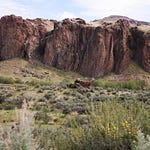Transcript
(sorry about typos)
I've been trying to learn a short song on the piano recently. Because right now, I'm house sitting at the place across the road from the yurt that I live in. And there's a piano in here, an upright. It's not very clean, it's actually kind of out of tune. And that is just the kind of quality of sound that I like.
Trying to learn something that someone else made, trying to copy it, is a very different process then just sitting down at the piano and playing whatever comes into my head—which is what I've always done. Trying to intentionally press certain notes is a lot more difficult than just letting the notes come out as they will.
But as soon as I started to learn some of this tune, I realized that there is music in the tune; that there is expansion available to these pre-made notes. In other words, there is further music inside of that tune to be found—and so I started playing around within the phrase, I guess it's called. To be honest, I have no training in music, so I don't know what I'm talking about. But I started playing around in the notes themselves.
And I've realized that just in that snippet of the song, there was maybe so much variation—just in five seconds of music.
And I really like that. Doing more with less: the idea behind that, what it brings up, what it results in. And I like that even though I'm not good at copying someone else's work, when I start playing, immediately what comes to mind is finding the music within the music.
When I write, I write in an unconstrained way. I never find myself writing to a rubric. I never set a certain amount of time I'm going to write for. I never set a time itself to write. I never set any kind of a goal.
I just have this general idea that I need to write as much as I can, which doesn't always work out. Because it's not very disciplined. But actually, it kind of does, because it seems like I tend to write a lot by not putting any constraints on it. It seems like I allow what comes to come, and I don't deal with the garbage. I don't produce crap in order to get to the good stuff. I just don't produce when there isn't anything worth writing, which I think is up for debate with a lot of people. And the funny thing is I recently haven't been able to really write, as well as I've been able to just talk. And talking is even more unconstrained, because as I speak I don't really remember what I just said.
All I'm doing is following a thought pattern. I can't go back and read the words I wrote down, I'm just here in the present saying whatever is coming to the forefront of my mind. And I think that it's a sign of a lack of constraint and an abundance of creativity: to be able to just talk, and not need a form, and still produce something intelligible.
Which I think is pretty difficult.
So, I've been thinking about the heart recently. Just last night, I read a piece by someone, I kind of, sort of know, who lives in Maine. Her name is Jenna Rozelle, and she writes about food, but it's more the idea of nourishment. I really appreciate her writing.
I think she's very articulate and prolific, and I like that. She hunts and has a relationship with wild landscapes. And she wrote about the heart recently just last night. In the article, she explained her experience of this season, and taking heart, and what gets her through some of the times, and other things.
Anyway, you should go check out her newsletter, Appetites. You can search for her name too.
So it got me thinking about the heart. And what I think of the heart has a very particular association with a lack of constraint. Because if anything, the heart ceases to function when it's constrained—when it has atherosclerosis in the arteries, calcification, or a lot of people deal with arrhythmia. Or afib.
And it's this idea of constraint that brings me back to thinking about the heart. My experience of the culture I live in, and what is being asked for in that culture and what is being permitted, and not permitted. In other words, constraint has a direct effect on the heart, in my opinion.
And this is coming from my studies recently with Chinese medicine and energetics and holistic medicine. But also, just my sense about these things that has developed for a decade or so now. And so what I see when I see constraint is a lack of heart
And to me the heart means also—so there's this idea in biomedicine that the heart is a pump, and it's goal is to push blood through the body. And while that's true in some sense, the heart has been shown by other medicine forms to be more of a sensory organ. And the perspective of Chinese medicine, of many perspectives on the heart, is that the blood actually is what pumps the heart.
So to explain that—the blood carries information in its temperature and flow. And so when it heads out to the periphery, it is cooled and comes back. The heart notices those changes. And it adapts as a result of the process of the blood moving through the body. And then the blood does so many things, obviously and the heart is adaptive to those needs. And so the heart I see as more of a sensory organ. And so, if you think about someone who has a closed heart, or a hardened heart, what do you think is going on there? Maybe a lack of of sensitivity of the world around them, a lack of sensitivity of their own emotions and of others.
And as for someone who has an open heart, what do you think their sensitivity of the world around them would be like? What kind of things do you imagine that person would allow in? What would they constrain? And where does that lack of constraint, or need for constraint, come from?
My idea is that it comes from a sense of protectiveness—of someone trying to preserve their internal well-being because they feel attacked, or they have trauma. And so if you come across an uncaring person, the result of that lack of care is often that they had extreme trauma. And they can't be sensitive anymore because they're trying to protect themselves. Which I mean, this is not revolutionary thinking at all. But a couple years ago, for me, it really was. And maybe for some people, thinking about the heart as a sensory organ, that responds to the needs of the body and even the emotions, rather than that it's a pump that goes on mindlessly—maybe this is a revolutionary thought.
So from what I understand in Chinese medicine is that the heart is seen as the place of one’s spirit. It's where the Shen, as they call it, rests every night. The Shen is kind of an animating principle. It is the quality of a person's experience, and intention in the world.1
So it's this reflective or responsive phenomenon that makes up who that person is. And so you can see a lot of interesting aspects here—if, for example, someone is hurt, often as a young kid, their Shen changes. And that would have a responsive or reflective aspect on the heart function. But potentially as well a you can actually see a shock such as that in the pulse. You can see it in atrial fibrillation. You can see it and tachycardia, or arrhythmia. You can see them being unstable. And so it affected the terrain, these shocks, and you can actually see it in the body. You can even see it, sometimes, on people's tongues.2
So in other words, the heart works best when it's unconstrained, when it doesn't have trauma, when it can be sensitive to the needs of the body and the spirit and to others around it. So the heart to me, is something that governs what is let in or what is excluded.
And that's really interesting to me because in the cultural moment that I perceive, there's so much hard-heartedness going on. Everyone wants to immediately come to a conclusion about who someone else, and what they believe in. Why? Because people are deeply afraid. They're trying to protect themselves from something that may hurt them, or has hurt them.
But the moment a protective wall goes up, communication stops, and calcification manifests. And I think it's really terrible to see all of these boxes that people or the culture want to live in, or basically build around themselves as a protective measure.
And I wonder if the this has deep implications. The number one cause of death in the United States is heart disease, right? So—it's like heart disease, maybe, comes from closing off oneself to external sensitivity and others emotional needs and a person's own emotional needs. And then the second one is cancer. Cancer may come from grief, unresolved grief... I don't know. It's pretty interesting.
Of course, this isn't conclusive information at all about how chemistry works inside of the body. But I think it has some interesting implications. And for me, explains to some degree how the heart looks and functions. What it does. In terms of the blood and sensitivity and how it senses relationship with others and how it makes up our sense of self.
And so to be grounded in oneself means to have a strong heart. To be sure of oneself is to have an intact circulatory system, essentially, an emotional system, and therefore a strong heart.
And to be open to the world means to allow things that may damage. But also to know that even though those things might cause damage, that can be healed or not necessarily fatal. That they can actually make the system stronger.
So when I first started running a couple years ago, it hurt. The circulatory system is not prepared for the muscles calling for so much oxygenated blood and the heart and the lungs and the blood suddenly have to work harder. And it's a process that takes time. But once a general fitness is achieved, it doesn't fade very quickly, I've noticed. Maybe it's been that I've been active for a lot of the summer, but I think it's interesting to understand that aspect of the heart—when stresses are placed on it, actually gets stronger, as long as the stresses aren't chronic and insidious. If they're healthy stressors, like difficult relationships that are worth it.
So when I write unconstrained, I feel like I'm letting my heart open. I'm allowing it to take in my thoughts. My emotions. What's happened before? What's coming next? What's happening right now? I can take in the world around me, by being unconstrained and open. And I find that I allow real sustenance to come in.
I guess that's what the heart means to me.
Dr. Heiner Fruehauf discusses the Pericardium organ network on this podcast. The pericardium is the biomedical “heart” organ analogue in Chinese Medicine.
https://www.truenatureradio.org/e/telltale-signs-on-the-tongue/













